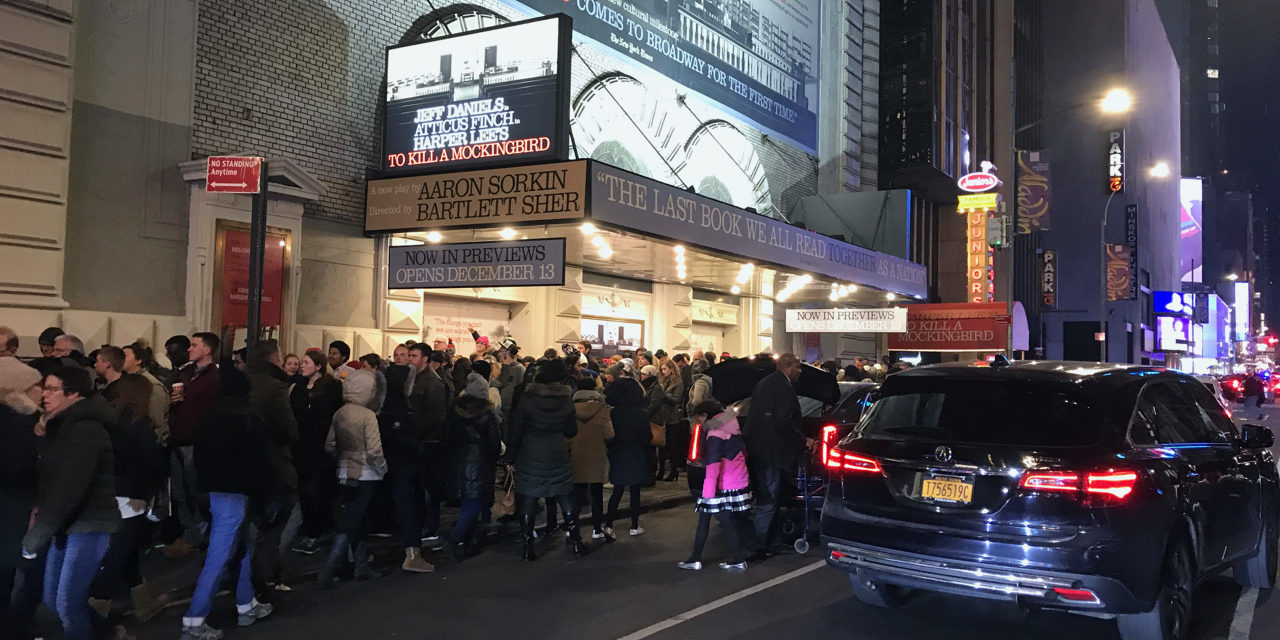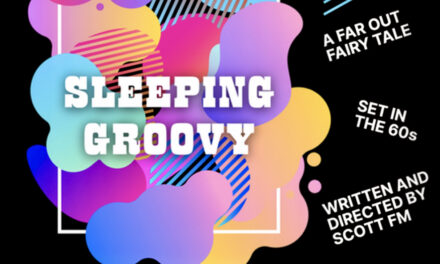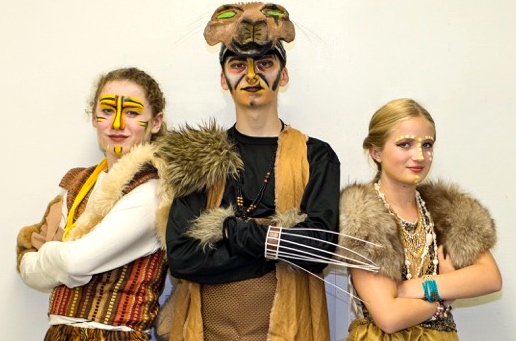(Above: Theatergoers waiting to enter the Shubert Theatre, where To Kill a Mockingbird opened recently; photo by Janelle Hartman)
Native Eugenean and former Register-Guard reporter Janelle Hartman has been making regular trips to New York City since moving to Washington, D.C. nearly 20 years ago. One or more Broadway shows are always on her agenda. Here she writes about the three most recent, including one especially hot ticket.
By Janelle Hartman
Barely 20 feet inside Broadway’s Shubert Theatre, squeezing along with everyone else past the rear orchestra to the stairs and aisles with less than 10 minutes to curtain for To Kill a Mockingbird, I spotted him.
The crowd had propelled me a few steps farther when I paused, turned back, and reached out to shake Aaron Sorkin’s hand.
And said one of the dumber things I could as a seasoned theatergoer: “Are you here for all the performances?”
Of course, the scriptwriter who adapted the revered 1960 novel for Broadway would be there faithfully during the preview run, fixated on every detail. Certainly a writer known for nursing every syllable of the witty, cerebral banter that is his trademark in Hollywood.
Telling him that I make regular treks to New York from Washington, D.C., to see shows, I held up my ticket with a smile and said, “This is the most expensive ticket I’ve ever bought.” Which it was, breaking by a sizeable margin the record I’d set this past spring with “The Band’s Visit.” Trust me, I will not be breaking the new record until I win the lottery.
With good-humored defensiveness — he was very friendly — Sorkin replied, “Don’t blame me, blame…”, naming someone I didn’t recognize. “No, no,” I said, worried he’d misunderstood. “I just meant that I really wanted to see the show.”
“I hope I don’t let you down,” he said.
He didn’t.
To Kill a Mockingbird is spellbinding, a feast of rich dialogue, superb acting and clever staging. In nonlinear fashion — the first departure from the book and the 1962 movie — it tells the wrenching story of a black man wrongfully accused of rape in 1934 Alabama. Knowing that our divided nation is fighting the same demons nearly a century later makes it that much more painful.Yet, woven with inherent goodness, friendship, love, wisdom and a healthy dose of humor, To Kill a Mockingbird turned out to be the most uplifting of the three powerful new plays I saw in the span of 36 hours, the others being American Son, 90 of the most anxiety-inducing minutes I’ve had in the theater, and, fresh from London, the inventive stage adaption of Network with a tour-de-force performance by Bryan Cranston.
Network, the 1976 movie, has been a career-long obsession of Sorkin’s. At a 2014 forum he called a fellow super-fan “the only living person who knows Network better than I do.” Now the stage version, which opened to critical acclaim, is playing across Broadway from Sorkin’s epic.
Kismet? The fate of To Kill a Mockingbird was in doubt this spring when author Harper Lee’s estate sued Sorkin, claiming his script was taking too many liberties with her 1960 novel. The case was settled two months later. Sorkin has said the executor requested 30 seats for opening night.
In the court of public opinion, theatergoers have been arguing about Sorkin’s changes since the first preview on Nov. 1. The casting of young adult actors as the Finch children is a particular source of ire, but it didn’t even occur to me to be bothered. The actors are terrific. Along with their friend, Dill — who broke my heart as he wept with anguish after the verdict — Scout and Jem narrate the story as older versions of themselves.
Rising to heresy for some of the book’s purists is that the children’s memories reveal the most human of fault lines in their father’s noble character, the legendary Atticus Finch. It felt authentic to me, a welcome catharsis, and the audience’s rousing applause tells me I wasn’t alone.
By and large, critics agreed, too, at the opening night show. Awarding it a “Critic’s Pick,” the New York Times’ Jesse Green called it “elegiac and effective” and “not guilty” of defacing the novel.
As Atticus Finch, Jeff Daniels is masterful. In fact he’s the only actor Sorkin, who cast him as the anchorman in HBO’s The Newsroom, ever considered for the role. Both are interviewed in this 60 Minutes segment, which includes clips of the play.
Finch’s interaction with the trial judge makes for some of the play’s most charming moments. Played by instantly recognizable character actor Dakin Matthews, the grandfatherly jurist has little patience for the prosecutor or the witnesses he knows full well are lying about Tom Robinson’s guilt. Turning the courtroom tables, Atticus admonishes him with a subtle “Judge” when he gets worked up, a single word delivered in a way that’s sheer delight. Putting aside a few disgruntled theatergoers and a handful of mixed-to-negative reviews, To Kill a Mockingbird has been a hit since its first performance. When I saw it three weeks into previews, I sat next to a woman who, like me, takes the train from the D.C. area to indulge her Broadway habit. Unlike me, she was already seeing the show for the third time.
Sorkin’s To Kill a Mockingbird undoubtedly will join the ranks of classic American plays, living on in revivals and generations of high school productions.
American Son could land on the list, too, if further down. For a frantic hour and a half, with no intermission, you watch the unraveling of a mother who’s been called to a police station in the middle of a rainy night. All she’s told is that her 18-year-old son was involved in an incident. Was he arrested? Injured? Worse?
Dread sets in the moment the curtain comes up on actress Kerry Washington (Scandal), perched restlessly on a vinyl sofa in an antiseptic waiting area. A young officer comes and goes, asking questions but answering none. Seeing the matinee, followed six hours later by To Kill a Mockingbird, was emotionally draining — two maddeningly familiar snapshots of race relations in the United States eight decades apart.
But the multi-layered tension of American Son takes your assumptions in directions you don’t expect. Yes, the young, white cop is a racist — exposed in a way I won’t spoil here — but he shows more mercy toward the black mother than the black community liaison officer does. His callousness sends you out of the theater with chills. That, and Kerry Washington’s plaintive wails.
The family at the center of the story is biracial and upper middle class; a bright future awaits the honor-roll son who’s never been in trouble with the law. But he’s also a teenager trying to figure out who he is. Weary of being the only black kid in his prep school, he makes new friends and does something monumentally stupid. Not illegal, but so lacking in common sense that it’s hard to fathom how his mother, who knew, didn’t put a stop to it in a nanosecond. Son, parents, police — everyone that fateful night played a role.
Even though you know it’s coming, the play’s final moments land a brutal blow. When I sprinted from my seat to the mezzanine lobby, determined as usual to beat the crowd, one of the ushers was standing far out of view of the stage. A young black woman, she’d told me earlier about her own son. I asked how she she deals with the play’s final moments night after night. “I try not to watch,” she said. “It’s too hard.”
Not all entertainment at Broadway shows is on stage. From my aisle seat in the second-to-last row of the Booth Theatre’s upper mezzanine, I overheard ushers whispering before curtain about the star’s diva-like behavior, as they saw it. They were irked by Washington’s refusal to make a pitch for the charity Broadway Cares, an Actors’ Equity program that has raised more than $300 million for AIDS and women’s health programs.
For a few weeks every spring and fall, most Broadway productions take part in fundraising drives, placing actors at the exits with red collection buckets. Cast-signed playbills, posters and other items are often available at premium prices.
Typically, as the curtain call winds down, a leading actor steps forward to talk about the charity’s good works. At the Booth, there were red buckets but no explanations. Washington wouldn’t do it or allow anyone else to, an usher said, because she wants people to “sit with” the ending. There’s a case to be made for that, though lots of shows that pack a punch do it anyway.
In fairness to Washington, there were neither announcements nor buckets at To Kill a Mockingbird or Network, though both shows were early in their preview runs and the fall Broadway Cares campaign was winding down.
Anyone who’s seen the movie, Network, knows how shockingly prescient it was in 1976. We are living the increasingly fact-free nightmare that screenwriter Paddy Chayefsky conjured up — Machiavellian media conglomerates, personality cults, “reality” TV. An industry selling its soul for ratings and profits. The play hasn’t been updated, but now you witness its hellscape unfold with the bitter knowledge that it’s all come true.
Taking your seat at the Belasco Theatre, you notice that the open set doesn’t look like any you’ve ever seen. Mostly laid out like a studio, there’s an anchor desk center stage in front of a giant video screen, with smaller screens all over the place. Stage right is a realistic control room; stage left is a restaurant/bar set where characters drink and actual audience members — who pay for the privilege, if you can call it that — eat dinner in front of a thousand people. A frenetic countdown to the night’s newscast opens the show, and the intensity never lets up.
An avant-garde multimedia spectacle, it keeps you guessing where to look. Online chatter suggests it aggravates at least as many theatergoers as it intrigues, but it’s certainly novel. At times, you hear characters talking and see them bigger than life on screen without having any idea where they are on stage.
One conversation takes place outside the theater, two actors strolling under and past the marquee on 44th Street as unwitting pedestrians make their Broadway debuts. What struck me about the scene was the rain beating against umbrellas: I knew it was going to be a wet walk, with little hope of a cab, to get to Penn Station for my late-night train.
Something Network audiences and critics agree on with no measurable dissent is Bryan Cranston’s gripping portrayal of unhinged anchorman Howard Beale. On theater boards, he’s the early favorite for next year’s Tony Award for best actor in a play. He won in 2014 for his jaw-dropping performance as LBJ in All the Way, bringing to life the 36th president’s relentless, arm-twisting campaign to pass the 1964 Civil Rights Act.
Musing and ranting as Howard Beale, Cranston roams into the audience at one point, cramming himself onto the arm rest between two surprised (happily or not) audience members. If you’re camera shy, don’t buy center orchestra seats: the middle section is projected onto the big screen until Cranston wanders back to the stage.
Network wrapped up my theater trip, possibly the only time I’ve seen three shows without one or more musicals in the mix. In their absence, holiday windows and outdoor markets, as irritatingly alike as they are year after year, were a welcome break from the weighty dramas.
Fortunately, there’s lighter fare ahead. Top of the list is the spring premiere of Tootsie, currently working out its kinks in Chicago.
By all early accounts, it’s going to be a smash, icing on the towering cake that is Broadway’s 2018-19 season.
I’m devouring all the slices I can.
Questions about Broadway shows, buying tickets, using discounts, best and worst seats, etc.? Email Janelle at JanelleOnBroadway@gmail.com.












